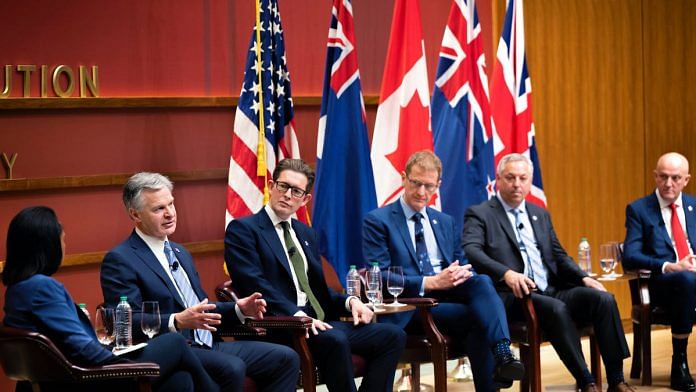New Delhi: In their first-ever joint public meeting, the intelligence chiefs of the Five Eyes countries gathered at Stanford University Tuesday to sound an alarm about the security threat posed by China.
In the discussion, the representatives of the Five Eyes— an intelligence alliance consisting of the United States, United Kingdom, Australia, Canada, and New Zealand— focused on China’s use of emerging technologies and sophisticated espionage to advance its own strategic goals.
“The Chinese Communist Party is the number one threat to innovation. China has made economic espionage and stealing others’ work and ideas a central component of its national strategy. That espionage is at the expense of innovators in all five nations,” said US Federal Bureau of Investigation (FBI) chief Christopher Wray during a press conference after the meet.
In the roughly hour-long conversation, leaders from the Australian Security Intelligence Organisation (ASIO), Federal Bureau of Investigation (FBI), British Security Service (MI5), Canadian Security Intelligence Service (CSIS), and New Zealand Security Intelligence Service, discussed numerous concerns.
These included China’s alleged theft of intellectual property, infiltration of private corporations and academic institutions through the recruitment of insiders, and formidable hacking capabilities. The discussion also touched upon China’s deployment of emerging technologies such as AI and quantum computing, among others.
The conversation, hosted by former US Secretary of State Condoleezza Rice, aimed to raise awareness within the private sector of the need to better protect technologies.
To that end, the alliance launched the “Five Principles of Secure Innovation”, namely Know the Threats, Secure your Environment, Secure your Products, Secure your Partnerships, and Secure your Growth.
“These partnerships between intelligence agencies and the private sector will not want to tell people what they should do or should not do but rather give them as much clarity as possible,” the FBI chief observed.
Also Read: What is ‘Five Eyes’, the intelligence alliance US wants South Korea, India, Japan to be part of
‘Well beyond traditional espionage’
Over the past few years, numerous countries in the West have accused China of stealing intellectual property, interfering in domestic issues through state-owned and other companies, and exploiting emerging technologies. Countries such as Germany have also released specific strategies to combat a rising China.
“The Chinese government is engaged in the most sustained, scaled and sophisticated theft of intellectual property and acquisition of expertise through means which are exploiting our open and collaborative DNA,” said ASIO director-general Mike Burgess.
The five leaders explored the various dangers of countries such as China and Russia exploiting emerging technologies, from virtual kidnappings, where AI can mimic children’s voices, to creating dual-use applications for military use.
Wray noted that the Chinese threat includes both the theft of AI and its misuse, while Burgess observed that though every nation spies, China’s actions go “well beyond traditional espionage”.
Burgess illustrated China’s intrusive actions using the example of an academic who was expelled from Australia last month “before the harm could be done”.
“Last month, ASIO detected and disrupted a plot to infiltrate a prestigious Australian research institution. The plot involved a visiting professor, an academic who was also recruited by the Chinese intelligence,” he said.
Throughout their discussion, the five intelligence chiefs highlighted the openness and space for collaboration in the West, which leads to innovation in technologies.
However, Wray observed that China is now reacting to this openness.
“This is essentially transnational repression, where the Chinese government is reacting very much to the openness we have which allows dissent and criticism of the Xi Jinping regime,” he said. “If there’s one thing they (CCP) can’t stand, it’s criticism.”
Wray added that it was one thing to “repress” the population in China and another to bring it into countries like the US and their campuses.
“I think it underscores the difference between Chinese Americans as not the culprits, but in many cases the victims,” he said.
Breaking silos to get back the upper hand
While the Five Eyes countries are constantly working to prevent AI and other technologies from falling into the hands of their adversaries, they have yet to fully exploit these technologies themselves.
One of the reasons for this, Burgess noted, is that these agencies need to account for “license to operate and rule of law when it comes to exploiting technology”.
To this, Wray added: “We are constrained by the rule of law.”
During the discussion, a proposed solution to address this challenge was to enhance collaboration with the private sector.
According to CSIS director David Vigneault, “cultural reticence” within his organisation was a challenge.
“The question is, you know, how can we legally and safely operate with these technologies in our environment, with the oversight we have and so on. But that cultural reticence from our organisation is something we need to break,” he said.
“We have top secret clearances that we operate in, an environment we’re very comfortable with, so breaking down these silos is one of the most important aspects, he added.
Similarly, New Zealand Security Intelligence Service director-general Andrew Hampton explained that security agencies need to be more “open and receptive” when it comes to working with the private sector.
“It is no longer agencies giving private sector steps to protect themselves, but rather a two-sided conversation, where we both need to work together to achieve an outcome,” he said.
Wray noted that a “paradigm shift” was in progress wherein security agencies are engaging more and more with the private sector.
“Agencies are working on how to protect the private sector,” he said, “while the private sector is helping agencies with how they can protect better.”
(Edited by Asavari Singh)
Also Read: 5 Eyes hold the secrets behind Trudeau’s charges. India must worry about its vulnerabilities



